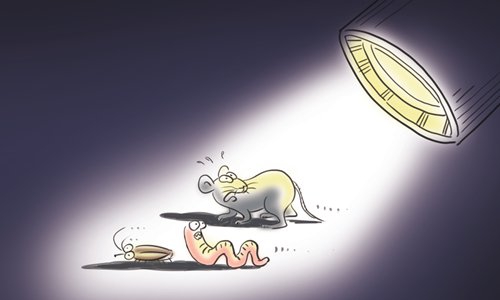
Illustration: Liu Rui/GT
A draft supervision law will be deliberated during this year's ongoing two sessions. Upon adoption of the law, a new supervisory network would be established, consisting of supervisory commissions at the national, provincial, city and county levels, with legally defined duties, liabilities and protocols.
As we all know, the structural and mechanical issues in the country's anti-corruption campaign have been high on the agenda within and outside the Communist Party of China (CPC). Over the years, the Party has been unwavering in its anti-corruption endeavor but there are still corruption cases in various manifestations, to the dismay of the public. After thorough analysis, the CPC Central Committee has found the main obstacles hindering their efforts. On the one hand, the function of anti-corruption organizations is too decentralized to form a concerted supervisory force. On the other, local authorities are too involved in the investigative and handling process of related cases. For instance, there are local governments that repeatedly fail to deal properly with an increasing influx of corruption cases.
Therefore, to open a new chapter in the anti-corruption campaign, the Party has to prescribe an adequate remedy by innovating an anti-corruption institution.
The fundamental task in reforming China's anti-corruption systems and institutions should be changing the highly fragmented and segmented institutional setup and arrangement. And the reform should aim at establishing an independent, authoritative and professional anti-corruption organ.
Under the current supervisory system, the CPC Central Commission for Discipline Inspection (CCDI) is the body for inner-Party supervision and an important force in disciplining and governing the Party, while local supervisory organs play a crucial role in ramping up administrative supervision and law-based governance. In between is a blank waiting to be filled: to bring all staff who exercise public power under its coverage. Consequently, a nationwide supervisory system becomes indispensable as it will enable wider supervision coverage in a variety of ways, consequently establishing a unified, authoritative and efficient supervision institution.
National supervisory system reform is a key strategic decision of the CPC Central Committee with Comrade Xi Jinping as the core and a major political system institutional reform concerned with the overall situation. The fundamental goal of reform is to strengthen the leadership of the CPC in the anti-corruption campaign, improve self-supervision of both the Party and the country and further modernize the State governance capacity and system.
The new top anti-graft body under the Party's leadership is a law enforcement and supervision organ. It covers all staff working in legislative, administrative, judicial and economic sectors, and works with means including education, prevention, investigation, admonishment and other measures that contribute to constructing clean government. In detail, the new supervisory body is responsible for planning, policymaking, inspection and instruction related to clean governance.
The commission will be created by the people's congresses to which they are responsible and by which they are supervised. And its staff will work along with the CCDI and share its resources. The CCDI supervises Party members with Party discipline but the new commission will oversee all public employees and those with public power, including members of the eight other political parties as well as non-Party people.
Setting up the commission is an important political reform for China and must be implemented within the legal framework. Therefore the ongoing NPC session will revise a certain part of the Constitution. It will add a new section about the national supervisory commission to the third chapter "The Structure of the State" in the Constitution, clarifying the nature, position, composition, functions and power of the supervisory commission.
According to the Constitution, the NPC has the power to elect and remove the director of the new anti-graft body, while the NPC Standing Committee shall appoint or remove its deputy directors and members at the recommendation of its director.
The commission shall have independent investigative power but must receive legal supervision. For instance, local people's congresses can set up special supervisory commissions to oversee the work of the supervisory commissions. And the commissions shall have their own internal supervision mechanisms to ensure clean and efficient operations. With these internal and external mechanisms, it is expected that the commission will grow to be a significant anti-corruption organ.


